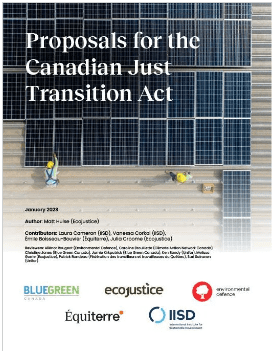Report measures how much Canada is falling behind other countries
Washington, D.C. – Canadians have missed out on approximately 66,000 jobs because the federal government has failed to match the U.S. in renewable energy investments, according to a report released today by Blue Green Canada, an alliance between Environmental Defence Canada and United Steelworkers. The report, Falling Behind: Canada’s Lost Clean Energy Jobs, is the first assessment of the employment impact of Canada’s failure to invest in clean energy and is being released today at the Good Jobs, Green Jobs conference in Washington, DC.
“Canada’s federal government keeps saying it’s matching U.S. efforts on energy and climate, but this is simply not true,” said Gillian McEachern, Program Manager, Environmental Defence Canada. “Ottawa is obsessed with protecting oil from the tar sands instead of catching up to other countries in creating clean energy jobs.”
The report measures the discrepancy in clean energy investment between the Canadian and U.S. federal governments since President Obama came to power. This measure includes support for renewable energy, greener transportation and energy efficiency. Key findings of the report include:
-
Canada’s clean energy investment gap is $11.5 billion – if Canada matched the U.S. on a per person basis, an additional Cdn $11.5 billion would have been invested in clean energy.
-
Canada dedicated less of its stimulus spending to clean energy than Mexico, the U.S., Australia, China and South Korea.
-
If Canada’s spending matched U.S. investment in renewable energy alone, an additional estimated 66,000 jobs would have been created. This does not include the jobs opportunities lost in greener transportation and energy efficiency.
“America is concerned China is out-competing them in the new energy economy, but Canada isn’t even keeping up with the U.S.,” said Ken Delaney of United Steelworkers. “Canadians who are unemployed or underemployed right now cannot afford Ottawa’s failure to support the economy of tomorrow.”
Within the next decade, clean energy could grow to become one of the world’s largest industrial sectors, ranking behind electronics and automotive products. Blue Green Canada is calling on the federal government to prevent Canada from falling further behind by matching or surpassing U.S. clean energy investment, putting a price on carbon and designing policies to support clean energy manufacturing in Canada.
The Good Jobs, Green Jobs conference, which runs from May 4 to 6, 2010 in Washington, D.C., is a gathering of labour, environmental organizations and business from across North America. The conference draws thousands of people and will be addressed by U.S. Energy Secretary Steven Chu, U.S. House of Representatives majority leader Nancy Pelosi, and U.S. Senator John Kerry, among others.
The report can be downloaded on the Blue Green Canada web site at www.bluegreencanada.ca or on the Environmental Defence web site at www.environmentaldefence.ca.
About Blue Green Canada (www.bluegreencanada.ca): Blue Green Canada is an alliance between the United Steelworkers and Environmental Defence Canada to support the development of good green jobs as part of a new green economy.
-30-
For more information, or to arrange an interview, contact:
Jennifer Foulds, Environmental Defence Canada, (416) 323-9521 ext 232; (647) 280-9521 (cell)
Denis St. Pierre, United Steelworkers, (416) 544-5990; (705) 562-8588 (cell); dstpierre@usw.ca


